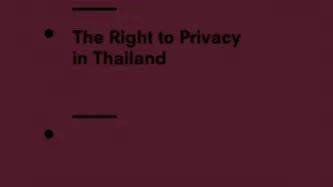Search
Content type: Press release
… calls for reforms and safeguards so that people's data and privacy is protected from unnecessarily intrusive practices. … and failures by the police in terms of data protection and privacy rights. The report comes as a result of PI’s … that was initiated, in part, because of that complaint. As stated in the report, page 12: "This investigation took into …
Content type: Long Read
… Edward Snowden leaked documents providing details about how states' mass surveillance programmes function, two states – the UK and South Africa – publicly admit using bulk … came during and as a result of legal proceedings brought by Privacy International and other civil society actors …
Content type: Long Read
… technologies prioritises corporate profits over peoples’ privacy There are solutions that can be used to address … organise, and protest without unlawful interference by the state authorities. Most of these surveillance technologies … of wrongdoing. This has happened in the past. In the United States, the now defunct National Security Entry-Exit …
Content type: Long Read
… Long Read Post date 29th January 2018 Privacy International is celebrating Data Privacy Week , … is particularly important when it comes to control of how States perform these activities. In fact, the first data … certain public goods, but these needs are also commonly overstated, and lead to diverse number of abuses and human …
Content type: Advocacy
… Advocacy Post date 3rd April 2017 Privacy International's submission on the right to privacy in Thailand, Human Rights Committee, 119th Session. … inadequate, unclear as to the powers, scope and capacity of state surveillance activities and thus it falls short of the …
Content type: Press release
… on the bill. Dr Gus Hosein, Executive Director of Privacy International, said: "In the UK, we've historically … fundamentally change the relationship between citizen and state, and their relationship with their internet and mobile …




